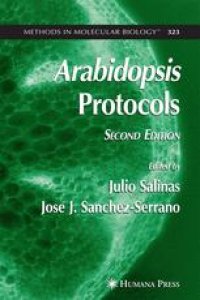
Ebook: Arabidopsis Protocols
- Tags: Plant Sciences
- Series: Methods in Molecular Biology 323
- Year: 2006
- Publisher: Humana Press
- Edition: 2nd
- Language: English
- pdf
Emulating the much-praised first edition of Arabidopsis Protocols, leading scientists have generated an up-to-date work that reflects recent advances in plant biology, the completion of the Arabidopsis genome sequence-essential for studying plant function-and the development of whole systems approaches that allow global analysis of gene expression, as well as protein and metabolite dynamics. The authors have included nearly all techniques developed in Arabidopsis, others recently adapted from more traditional work in crop species, and the latest using Arabidopsis as a model system. Highlights include the most recent methods-transcriptomics, proteomics, and metabolomics-and their novel applications (phosphoproteomics, DNA microarray-based genotyping, high throughput metabolite profiling, and single-cell RNA). Traditional protocols from the agricultural sciences and others developed in crop species (grafting and chloroplast transformation) have been adapted to exploit the advantages of the Arabidopsis model. The protocols themselves follow the successful Methods in Molecular Biology™ series format, each offering step-by-step laboratory instructions, an introduction outlining the principles behind the technique, lists of the necessary equipment and reagents, and tips on troubleshooting and avoiding known pitfalls.
Indispensable and highly practical, Arabidopsis Protocols, Second Edition offers both novice and experienced plant biologists cutting-edge tools to explore new scenarios and gain an understanding of how this complex, multicellular organism works, how it copes with a sessile life style, and how these strategies compare with those developed in other organisms.
Emulating the much-praised first edition of Arabidopsis Protocols, leading scientists have generated an up-to-date work that reflects recent advances in plant biology, the completion of the Arabidopsis genome sequence-essential for studying plant function-and the development of whole systems approaches that allow global analysis of gene expression, as well as protein and metabolite dynamics. The authors have included nearly all techniques developed in Arabidopsis, others recently adapted from more traditional work in crop species, and the latest using Arabidopsis as a model system. Highlights include the most recent methods-transcriptomics, proteomics, and metabolomics-and their novel applications (phosphoproteomics, DNA microarray-based genotyping, high throughput metabolite profiling, and single-cell RNA). Traditional protocols from the agricultural sciences and others developed in crop species (grafting and chloroplast transformation) have been adapted to exploit the advantages of the Arabidopsis model. The protocols themselves follow the successful Methods in Molecular Biology™ series format, each offering step-by-step laboratory instructions, an introduction outlining the principles behind the technique, lists of the necessary equipment and reagents, and tips on troubleshooting and avoiding known pitfalls.
Indispensable and highly practical, Arabidopsis Protocols, Second Edition offers both novice and experienced plant biologists cutting-edge tools to explore new scenarios and gain an understanding of how this complex, multicellular organism works, how it copes with a sessile life style, and how these strategies compare with those developed in other organisms.
Emulating the much-praised first edition of Arabidopsis Protocols, leading scientists have generated an up-to-date work that reflects recent advances in plant biology, the completion of the Arabidopsis genome sequence-essential for studying plant function-and the development of whole systems approaches that allow global analysis of gene expression, as well as protein and metabolite dynamics. The authors have included nearly all techniques developed in Arabidopsis, others recently adapted from more traditional work in crop species, and the latest using Arabidopsis as a model system. Highlights include the most recent methods-transcriptomics, proteomics, and metabolomics-and their novel applications (phosphoproteomics, DNA microarray-based genotyping, high throughput metabolite profiling, and single-cell RNA). Traditional protocols from the agricultural sciences and others developed in crop species (grafting and chloroplast transformation) have been adapted to exploit the advantages of the Arabidopsis model. The protocols themselves follow the successful Methods in Molecular Biology™ series format, each offering step-by-step laboratory instructions, an introduction outlining the principles behind the technique, lists of the necessary equipment and reagents, and tips on troubleshooting and avoiding known pitfalls.
Indispensable and highly practical, Arabidopsis Protocols, Second Edition offers both novice and experienced plant biologists cutting-edge tools to explore new scenarios and gain an understanding of how this complex, multicellular organism works, how it copes with a sessile life style, and how these strategies compare with those developed in other organisms.
Content:
Front Matter....Pages i-xv
Front Matter....Pages 1-1
Front Matter....Pages 3-12
Front Matter....Pages 13-25
Front Matter....Pages 27-38
Front Matter....Pages 39-44
Front Matter....Pages 45-61
Front Matter....Pages 63-63
Back Matter....Pages 65-77
....Pages 79-99